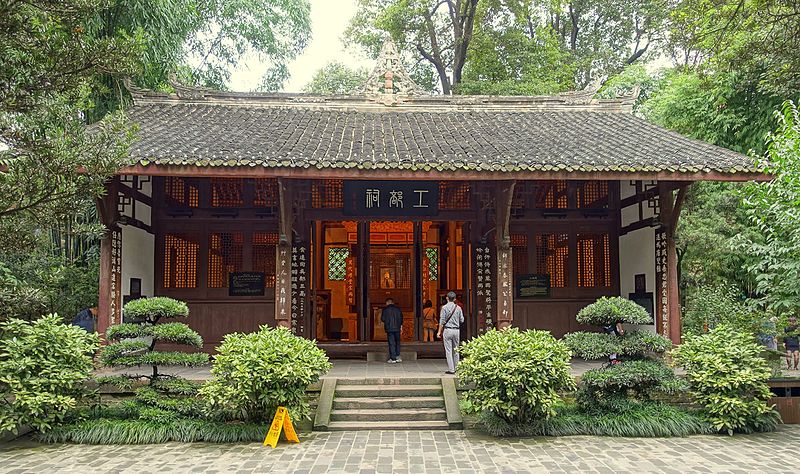Du Fu Thatched Cottage, located in Chengdu, Sichuan Province, China, is a historic site dedicated to the renowned Tang Dynasty poet Du Fu. Originally built in 759 AD, the cottage served as Du Fu’s residence for four years during which he composed nearly 240 poems. The site has been rebuilt and expanded over the centuries, now covering an area of 24 hectares. It features traditional Chinese architecture, beautiful gardens, and exhibits showcasing Du Fu’s life and works. The cottage is not only a tribute to one of China’s greatest poets but also an important cultural landmark that offers visitors insight into Tang Dynasty literature and history.
Nestled in the heart of Chengdu, China, lies a humble yet profoundly significant site that has captivated poetry enthusiasts and history buffs alike for centuries. The Du Fu Thatched Cottage, a tranquil oasis amidst the bustling city, stands as a testament to the enduring legacy of one of China’s most revered poets, Du Fu.
As you step into the grounds of this historic site, you’re immediately transported back in time to the Tang Dynasty, when Du Fu sought refuge here during a tumultuous period in Chinese history. The cottage, though reconstructed over the years, still exudes the simplicity and rustic charm that inspired some of Du Fu’s most celebrated works. It’s easy to imagine the great poet sitting beneath the swaying bamboo, brush in hand, composing verses that would resonate through the ages.
While the original thatched cottage no longer stands, the reconstructed version faithfully captures the essence of Du Fu’s humble abode. The site has been expanded over the centuries to include beautiful gardens, serene ponds, and additional buildings that showcase the poet’s life and works. As you wander through the grounds, you’ll encounter numerous stone tablets and monuments inscribed with Du Fu’s poetry, offering visitors a chance to immerse themselves in his lyrical world.
One of the most striking features of the Du Fu Thatched Cottage is the way it seamlessly blends natural beauty with literary significance. The lush gardens, filled with vibrant flowers and ancient trees, provide a picturesque backdrop that seems to bring Du Fu’s nature-inspired verses to life. It’s not uncommon to see visitors sitting quietly beneath the shade of a ginkgo tree, lost in contemplation or scribbling their own poetic musings.
As you explore the site, you’ll come across various exhibitions that delve deeper into Du Fu’s life and literary contributions. These displays offer fascinating insights into the historical context of his work, the techniques he employed, and the profound impact he had on Chinese literature. Even if you’re not well-versed in classical Chinese poetry, these exhibits provide an accessible entry point into Du Fu’s world, helping visitors appreciate the depth and beauty of his art.
One of the most popular attractions within the complex is the Du Fu Memorial Hall, which houses a wealth of artifacts and information related to the poet’s life. Here, you can view replicas of Du Fu’s manuscripts, learn about his family and contemporaries, and gain a deeper understanding of the social and political climate that shaped his worldview.
Throughout the year, the Du Fu Thatched Cottage hosts various cultural events and activities that celebrate the poet’s legacy. From poetry readings and calligraphy demonstrations to traditional music performances, these events offer visitors a chance to engage with Chinese culture in a meaningful way. It’s a testament to Du Fu’s enduring influence that his works continue to inspire and resonate with people from all walks of life, centuries after they were first penned.
As you conclude your visit to the Du Fu Thatched Cottage, you may find yourself reflecting on the power of poetry to transcend time and cultural boundaries. The site serves not only as a tribute to a great literary figure but also as a reminder of the universal themes that Du Fu explored in his work – love, nature, social justice, and the human condition. In this sense, the thatched cottage becomes more than just a historical landmark; it’s a bridge connecting us to the past and inviting us to contemplate our own place in the grand tapestry of human experience.Du Fu’s Thatched Cottage stands as a testament to the enduring legacy of one of China’s greatest poets. This humble dwelling, reconstructed to honor Du Fu’s memory, serves as a cultural landmark and a window into the poet’s life during the Tang Dynasty. The cottage and its surrounding gardens not only preserve the essence of Du Fu’s simple lifestyle but also provide visitors with a tangible connection to his literary works. As a symbol of artistic inspiration and resilience in the face of adversity, Du Fu’s Thatched Cottage continues to inspire poets, scholars, and tourists alike, cementing its place as an important site in Chinese literary history and cultural heritage.

